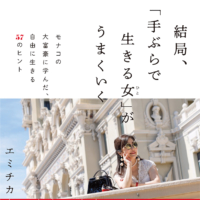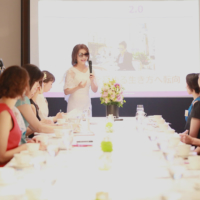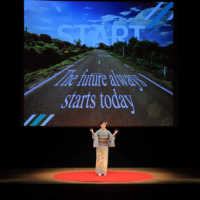“Do not try to score 100 out of 100 points in your life because those are the points you earn from others, which will not make you truly happy. Only look to yourself to discover what makes you happy.” This is the message that Marraige Emichika, who was born Chika Emi but goes by Emichika, is trying to deliver through her book “Live ‘Empty-Handed’ to be Successful – 57 Hints I Got from Billionaires in Monaco,” which will be published in October.
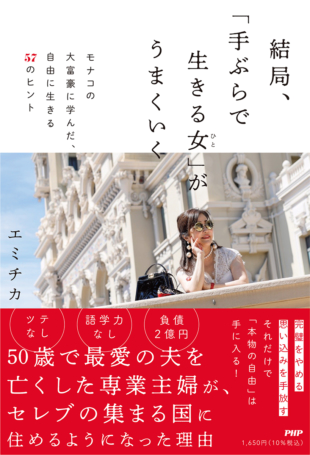
As a woman who experienced the tragic loss of her husband, started a new business on her own at the age of 50 and survived a critical illness, Emichika said in a recent online interview with The Japan Times that she has so much to share with women of all generations. “It doesn’t matter if you are a woman over 50 years of age. The future always starts today,” she said.
Early experience with loss
Emichika was born in Mie Prefecture in 1960. “I had been a good girl since I was little, but even more so after my father died young,” she said. It was as if she suddenly lost a map of hope that she believed would guide her to happiness. “Back then, children raised by single parents had a hard time getting a good job or getting married,” she said. But seeing her mother struggle every day to support her family, she tried hard to be strong and put on a happy face. At the same time, as if trying to fill the hole in her heart, she yearned for a happy marriage and family life. “I thought that I was finally given a new map of hope when I married my husband,” she said.
Her husband was an ophthalmologist who ran his own clinic. She was happy being the perfect wife and mother, earnestly following the new “map” provided by her husband. However, the map was again suddenly taken away when her husband died unexpectedly in 2011. Never had she imagined that she would lead the same life as her mother. Devastated, she felt as if everything she had so meticulously built up and maintained had fallen apart in an instant.
Having played her given roles in a sheltered world for such a long time, she was too naive and trusting to face reality. “Some people whom I had thought of as friends just looked away when all I needed was comfort, and others approached me with the greedy speculation that I inherited a fortune,” she said. Nonetheless, she initially hoped someone would bring her a new map. “But I was too scared to just sit there and do nothing. Of course, I had not gotten over the loss, but I needed to stand up anyway,” she said. “It was like opening heavy barred doors one by one in a desert.”
A change of direction
She did not know where to start. At the age of 50 and living in a rural town as the recently widowed wife of an eye doctor without any vocational skills, it was not easy to even get a part-time job. The quickest way to make a living seemed to be restarting and continuing what her husband left behind. She hired a new female doctor and managed the clinic as the owner. “But soon I realized that it would not work well because we had different purposes in life, which was natural because we were not a family. So, I decided to stop clinging to the world of medicine,” she said.
In 2012, Emichika launched a company focused on running aesthetic salons and developing and selling cosmetics under the corporate name Emichika Co. It did not go all that well from the beginning, but she couldn’t afford to stop. “I failed 98% of the time. But if you fail as a result of taking a step forward, it is not a failure, but an experience that helps build your ability to judge, decide, predict and communicate,” she said. “I had neither skills nor knowledge. All I had was the energy to take action,” she said, explaining how she took the risk of asking people to teach her what she did not know and to introduce her to more people. “I received a lot from other people, and I thanked them. The more I appreciated, the more I received.” At this time, she still believed that both happiness and misfortune were brought on by others.
Another setback
Just when her business was expanding rapidly, achieving annual sales of ¥700 million, she was struck by a serious illness. Starting with piercing pain in her eyes, she had severe symptoms of hyperthyroidism. Emichika went through eight operations and a drug therapy regimen. “I was in the world of harsh competition where being away from the front line for just 10 days could make it impossible to catch up,” she said. “I felt as if I was losing everything all over again.”
“I was not dying, but I was not recovering either. It was unimaginably hard to have absolutely no idea about my own future. I was desperately looking for answers,” she said. Her doctor would not offer anything other than medical treatment. “I was irritated at first, but soon realized that doctors specialize in fixing patients’ bodies, not their lives. I started to talk to myself to figure out what to do if I could not return to who I was before because a future cannot be found in the past.” That was when she accidentally came upon the phrase “issai yui shinzo” (“the mind creates everything”), in one of the books sold at the hospital. “It is a Zen idea that means everything you experience is created by your mind. Then all the answers as to what to do next are in your mind, too. It convinced me that I was right in talking to myself,” she said.
Emichika started to communicate with her inner self to find out what it was that she really wanted in her life. “The life you truly want is often different from the one that seems to be currently fulfilling. But it is harder to realize it or express it when you are satisfied with what you have now,” she said.
“To measure happiness, I had always relied on things that were visible and easy for everyone to recognize, such as numbers and titles. If you are saddled with stereotypes and evaluations from others, however, you will be too heavy to jump any hurdles,” she said. Emichika then asked herself if happiness as measured by other people would really make her happy. When she realized it would not, she made a change and started asking the same question to other women who needed advice.
A new direction
“I wanted to start all over from zero, so I chose to live in Monaco, which was a place that my husband and I visited during trips to academic conferences in Europe,” Emichika said, adding that it bears a geographic resemblance to Ise, which is close to where she is from, and also made her feel as if her husband was encouraging her to make it her second homeland.

Again, she asked herself what it was that she really wanted, and decided that she wanted to live not just anywhere in Monaco, but in a special place with the best view — an apartment right in front of the Prince’s Palace of Monaco overlooking the Port de Fontvieille. “But it is not an area where foreigners can just rent rooms as they like. Because of the proximity to the palace, there are many strict rules to follow, and you need to have trustful relationships with local connections. I had no idea where to start,” she said.

It was at a dinner party where she had the fateful encounter that would make her dream come true. Without knowing the lady sitting next to her happened to be the owner of the apartment building she was dying to live in, Emichika was talking over dinner about her determination to do whatever she could to live there. The owner told her who she was and wrote down her phone number on a piece of paper.
She could not believe her luck, but she also realized it was expected because she was so determined to succeed that she had envisioned her dream coming true countless times. “This is how I managed to become the very first Japanese to have a home right in front of the palace in Monaco,” she said.
Monaco turned out to be the perfect place to learn and an ideal place to disseminate her messages. In addition to the fact that Grace Kelly, the icon Emichika admires as a woman who made a life-changing decision, came all the way from the United States where she was an actress to live the rest of her life as a princess in Monaco, the place and the people seemed to have the power she needed.
“Monaco was suffering from poverty at one point in history, but it became a country that attracts visitors from all over the world. I feel that people here are passionate about their lives and good at creating happiness and inspiration,” she said, pointing out that wealth may expand one’s options in life, but does not supply all the satisfaction. “You must shave off all that’s unnecessary and remove the things that you did not decide for yourself. Carve out the essence of yourself.” This is the message she is delivering through her “Flawless Method” coaching seminars, which have empowered more than 2,000 women so far.
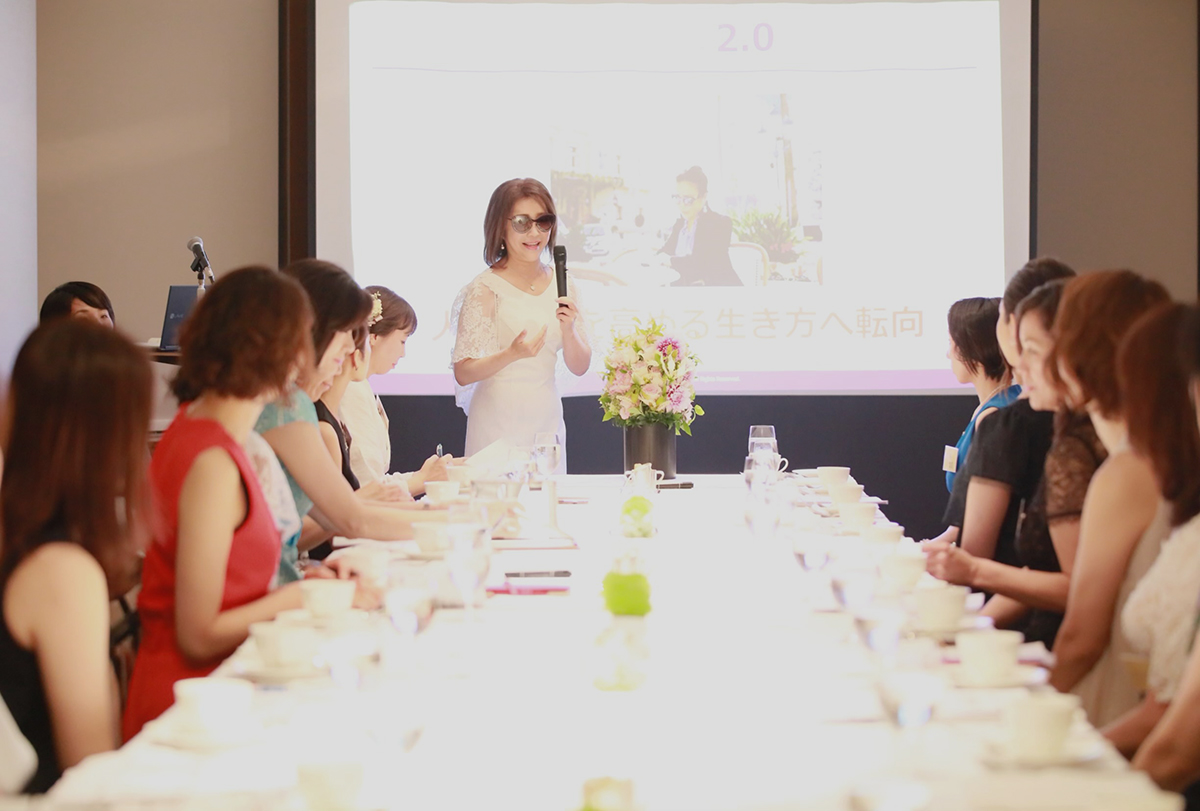
“I have also coined the term ‘Yume-Kime’ to encourage women to define their dreams,” she said. In Japanese, yume means dream and kime comes from kimeru, which means decide. “You need resolve to realize your dream. Resolve in Japanese is ketsudan, which consists of two kanji, ketsu (decide) and dan (cut off),” she said, emphasizing the importance of focusing only on what is really necessary for oneself. Some companies have been so impressed by this concept and her way of life that they’ve asked her to become an adviser or external board member, Emichika said.
In addition to the seminars, Emichika spoke at a TEDx event in Tunisia in July to encourage people to talk to themselves instead of to others. “Don’t scatter your negative feelings. Some people may listen, but they cannot give you answers. You’ll be far more convinced if you talk to yourself,” she said. “Try not to look for any ideal image somewhere else. You can create your own path in life right now.”
Her powerful presentation about her life and beliefs, which ended with the passionate message, “Embrace the here and now, envision your future and embark on your journey with your aesthetic awareness of life in your heart,” attracted attention from a global audience. She said it became the most viewed Tedx Talks video of the month worldwide, and that she believes she was the first Japanese woman to do that. “I am glad my thoughts have been recognized as being worth sharing even though I am a normal woman over 60 who is neither a social activist nor an academic,” she said.
Her book also includes tips on how to create one’s own happiness and enjoy life, as well as how to let go of the notion that you need to be a “perfect 10” or match a standard set by someone else. “It is like a book of recipes. You can open any page you like depending on your daily mood and feel inspired,” she said. “It’s never too late to change your life.”
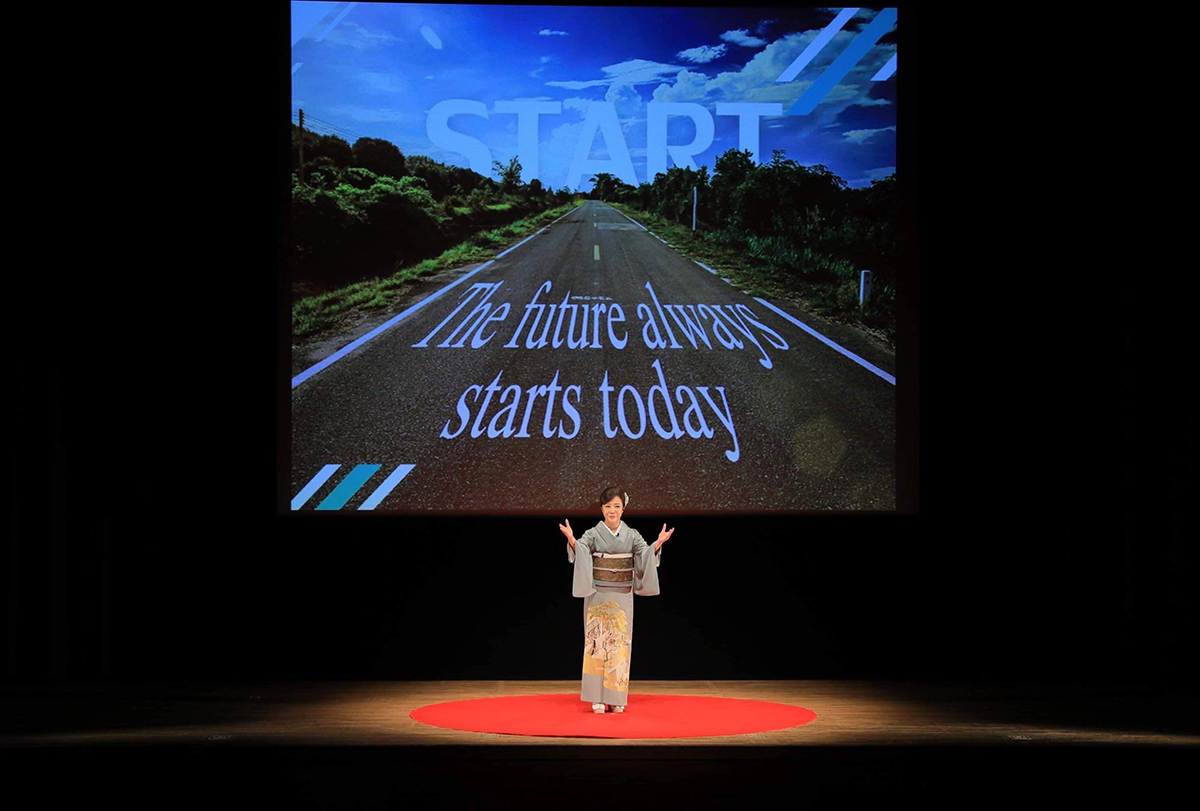
For more information on Emichika, visit https://emichika.style/
Download the PDF of The Emichika Story





